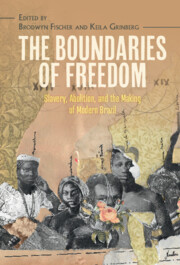Book contents
- The Boundaries of Freedom
- Afro-Latin America
- The Boundaries of Freedom
- Copyright page
- Contents
- Figures
- Tables
- Acknowledgments
- Introduction Slavery and Freedom in Nineteenth-Century Brazil
- Part I Law, Precarity, and Affective Economies during Brazil’s Slave Empire
- Part II Bounded Emancipations
- Part III Racial Silence and Black Intellectual Subjectivities
- Part IV Afterlives of Slavery, Afterwards of Abolition
- 13 The Past Was Black
- 14 From Crias da Casa to Filhos de Criação
- 15 Slave Songs and Racism in the Post-Abolition Americas
- Bibliography
- Index
14 - From Crias da Casa to Filhos de Criação
Raising Illegitimate Children in the “Big House” in Post-Abolition Brazil
from Part IV - Afterlives of Slavery, Afterwards of Abolition
- The Boundaries of Freedom
- Afro-Latin America
- The Boundaries of Freedom
- Copyright page
- Contents
- Figures
- Tables
- Acknowledgments
- Introduction Slavery and Freedom in Nineteenth-Century Brazil
- Part I Law, Precarity, and Affective Economies during Brazil’s Slave Empire
- Part II Bounded Emancipations
- Part III Racial Silence and Black Intellectual Subjectivities
- Part IV Afterlives of Slavery, Afterwards of Abolition
- 13 The Past Was Black
- 14 From Crias da Casa to Filhos de Criação
- 15 Slave Songs and Racism in the Post-Abolition Americas
- Bibliography
- Index
Summary
This chapter explores the legacy of the patriarchal family structures that were central to Brazilian slavery by exploring the stories of two filhos de criação who brought paternity suits against their natal families in early twentieth-century Brazil. Each was born to an enslaved mother and raised in his alleged white father’s household at the end of the nineteenth century. Their experiences offer rare insight into the internal dynamics of a particular extended family structure that emerged from plantation slavery, in which lower-status filhos de criação were raised to occupy a variety of differentiated social positions within hierarchical extended families. These children seldom moved into the class status of their “legitimate” relatives but instead often maintained life-long, unequal relationships that combined different measures of love, affection, dependence, servitude, and resentment. Their stories reveal continuing uncertainty over how to define and enforce paternal responsibility and family membership in the aftermath of slavery.
- Type
- Chapter
- Information
- The Boundaries of FreedomSlavery, Abolition, and the Making of Modern Brazil, pp. 368 - 387Publisher: Cambridge University PressPrint publication year: 2022

